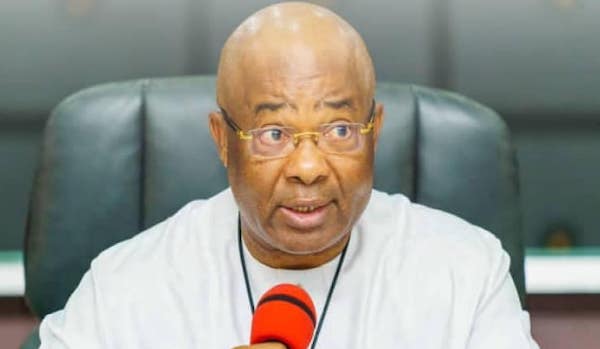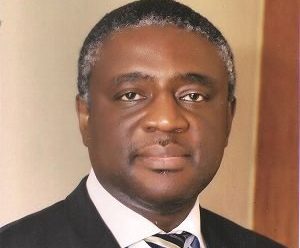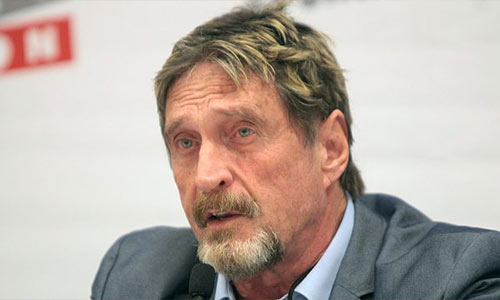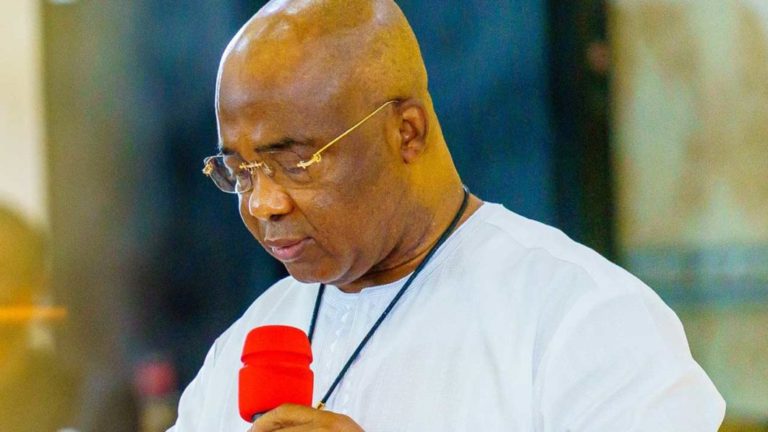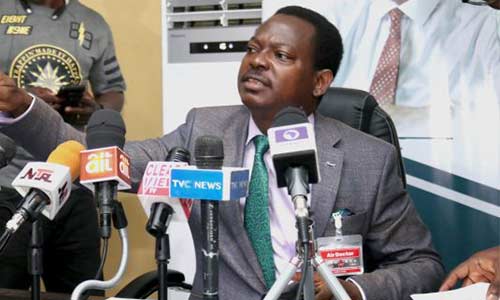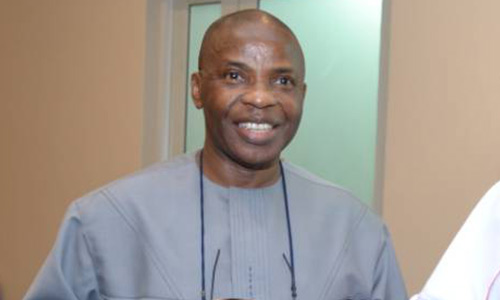Enugu based Legal Practitioner and the originator of the Online Petition calling for the suspension of the AGF’s SAN rank, Mr. Izu Aniagu has petitioned the Chief Justice of Nigeria over the numerous sins of the Attorney General of the Federation.
In the detailed petition sent to the Chief Justice of Nigeria, Mohammed Tanko, Mr. Aniagu narrated the gravity of the various acts allegedly committed by the AGF against the legal Profession.
Aniagu urged the CJN to take appropriate steps to address the act of unpardonable impunities emanating from the office of the Attorney General of the federation and Minister of justice, Abubakar Malami, SAN.
BarristerNG recalls that about 10,000 lawyers signed the Online Petition by Mr. Aniagu when it was published online.
Mr. Izu Aniagu Esq
Read the full petition Below
1st October, 2020
The Honourable Chief Justice of Nigeria and Chairman,
Legal Practioners’ Privileges Committee,
Supreme Court of Nigeria Complex,
Three Arms Zone,
Abuja.
Through:
The Chief Registrar of Supreme Court and Secretary of the
Legal Practitioners’ Privileges Committee,
Secretariat of the Legal Practioners’ Privileges Committee,
Supreme Court of Nigeria Complex
Ground Floor, Abuja.
Your Lordship,
SUSPENSION OF THE RANK OF SENIOR ADVOCATE OF NIGERIA AND ALL RELATED RIGHTS AND PRIVILEGES ON MR. ABUBAKAR MALAMI, SAN, ON THE GROUNDS OF CORRUPTION, ABUSE OF OFFICE, BALKANIZATION AND INTIMIDATION OF THE NIGERIAN BAR AND THE JUDICIARY.
Please, accept and record this letter as my petition against the Attorney General of the Federation, Abubakar Malami, SAN, with reference to the subject matter also captured therein.
This petition, first and foremost, arose in view of the recent Statutory Instrument No. 15 of 2020 (the “Instrument”) issued by Mr. Abubakar Malami, SAN, which purportedly amended the 2007 Rules of Professional Conduct for Legal Practitioners (RPC). The said amendment effectively removed certain provisions, including the provisions on stamp and seal for legal practitioners and payment of practicing fee.
It would be recalled, my Lord, that the above amendment of the RPC evoked agitated reactions from Nigerian lawyers and was also greeted with so much anger even from among ordinary people for not following procedure as prescribed by the enabling law.
Section 12 (4) of the Legal Practitioners Act (as amended) confers the power to issue rules of professional conduct for legal practitioners, and any amendments thereto, on the General Council of the Bar (the “Bar Council”). The Bar Council comprises the Honourable Attorney-General of the Federation, the Honourable Attorneys-General of the thirty-six states of Nigeria, and twenty members of the NBA. Consequently, the RPC and any amendments thereto may only be validly issued after it has been deliberated upon and approved at a properly convened meeting of the Bar Council.
My Lord, there is, unfortunately, no evidence of a meeting convened by members of the Bar Council with respect to the said instrument. As a matter of fact, no member admitted to have been issued with notice of any meeting leading to some of them vowing to challenge the action of the Attorney General in the law court. Therefore, to that extent, it is only safe to conclude that the Attorney General of the Federation acted unilaterally and illegally in his decision to amend the RPC.
My Lord, the action of Mr. Abubakar Malami should have been ordinarily glossed over as a mere “passion of the moment”. However, doing so at this point will be dangerous, especially in view of his habitual desecration of the legal profession since his assumption of office. Mr. Abubakar Malami, from inception has abused his position to the extent that further indifference to his impunity, which of course has already pervaded the entire judicial process, will inevitably lead to the implosion of the legal profession in Nigeria.
Aside his other malfeasance, by circumventing the Bar Council to arrogate to himself the unilateral power to make laws for the body of the legal profession, Mr. Malami has shown his unpretentious loathing for the rule of law and as such must be punished in accordance with the laid down procedures.
The Legal Practitioners’ Privileges Committee (LPPC) by virtue of section 5 (7) of the LPA CAP L11 LFN, 2004 is saddled with the responsibility to make the guidelines and confer the rank of Senior Advocate of Nigeria to qualified legal practitioners in Nigeria. The guidelines contain certain criteria that must be considered for the conferment/withdrawal of the rank, which must not only pre-exist in a candidate but must inure in him even after the conferment of the rank. Some of these criteria as provided in Paragraph 19 (1) of the Guidelines are as follows:
“a candidate must demonstrate high professional and personal integrity; be honest and straightforward in all his professional/personal dealings; be of good character and reputation; show observance of the Code of Conduct and etiquette at the Bar; and demonstrate high level of understanding of cultural and social diversity characteristic of the Nigerian Society”. See also Sub-paragraph (17) (a) which provides “that a candidate should demonstrate clear qualities of leadership and loyalty to the legal profession.”
My Lord, Mr. Malami has overtime demonstrated uncommon disregard and disloyalty to the legal profession. His unilateral issuance of a new RPC has deepened the division among lawyers. He is accused to have unilaterally amended the RPC with intendment to facilitate the breakaway of lawyers from the northern part of the country from the national body and create a factional body known as the Northern Bar Association.
It is a public record, my Lord, that some group of lawyers from the north in the guise of protesting the disinvitation of Governor Nasir El-Rufai by the NBA to her annual Bar Conference, wrote to the Attorney General and demanded his endorsement and recognition of a splinter body. It is also on record, that following that demand, Mr. Malami, responded a few days after by issuing a new RPC. The timing of his illegal action which unfortunately coincided with the time the new leadership of NBA was trying to settle grievances generated during the bar election has brought a sad day in the legal profession.
There’s no doubt that Mr. Malami’s action is a clear contravention of the guidelines which provide for honesty, straightforwardness and loyalty to one’s professional/personal dealings. He is also guilty for failing to understand the cultural and social diversity characteristic of the Nigerian Society as provided in the Guidlines. This is because, rather than demonstrating leadership, Mr. Malami exploited the misunderstanding arising from the diversity in culture and opinion among legal practitioners to alter the power of a united bar in favour of a select few.
My Lord, while we agree with Mr. Malami that every citizen of Nigeria has the right to freedom of association and right to conduct his or her cases in the law courts, the requirement of NBA’s stamp and seal has never been to prejudice those rights. The RPC only seeks to checkmate the activities of quacks parading as lawyers. Without a strong body and/or instruments to checkmate practitioners, my Lord will agree with me that every profession will undoubtedly go the way of the dogs.
Going further, my Lord, it is also a well known fact that Mr. Abubakar Malami, as the Attorney General and Minister of justice, has been in the eyes of the storm for many wrong reasons including wanton disregard to court orders, lack of diligent prosecution, failure to prosecute, shielding of suspects, usurpation of offices, indiscriminate filing of nolle prosequi and/or withdrawal of cases, as well as bias and corruption.
By virtue of Paragraph 25 (1) (a) of the Guidelines, “the rank of a Senior Advocate of Nigeria may be withdrawn from any person holding the rank by the Legal Practitioners’ Privileges Committee if the person is adjudged to have conducted himself in a manner incompatible with the dignity and honour of the rank; or guilty of professional misconduct.”
Mr. Malami, by persistently obstructing the cause of justice, even as the chief law officer of the federation, has conducted himself in a manner incompatible with the dignity and honour of the rank of Senior Advocate of Nigeria.
On November 18, 2018, through a lawyer from his office, Pius Akuta, Mr. Malami withdrew a fraud case filed by the EFCC at Lagos High Court against John Abebe, younger brother to late Stella Obasanjo. As the Attorney General of the Federation, he also filed for the discontinuation of a N25 billion criminal charge against Senator Danjuma Goje without any justification after over seven years of diligent investigation and prosecution by the Economic and Financial Crimes Commission (EFCC).
Furthermore, my Lord, Mr. Malami withdrew a criminal case against the Chairman, Code of Conduct Tribunal (CCT), Danladi Umar; and also demanded for the withdrawal of the cases against Mohammed Bello Adoke, Diezani Alison-Madueke and others involved in the Malabu Oil scandal.
As the Chief Law Officer of the Federation, Mr. Malami also withdrew criminal charges against soldiers accused of killing police officers and a civilian in the bid to aid the escape of billionaire kidnapper, Bala Hamisu, popularly known as Wadume; and also suspended the investigation of alleged fraud in Nigeria Incentive-Based Risk Sharing System for Agricultural Lending (NIRSAL).
Other ignominious acts by the Attorney General, my Lord, include halting the prosecution of former Comptroller General of Customs, Mohammed Inde Dikko, shielding the ex-Customs boss from refunding of $8million to the governmen; and writing a letter dated 16th December, 2016 withdrawing the case of fraud filed against Godsday Orubebe, former Minister for Niger Delta; as well as the reinstatement of Abdulrasheed Maina, former Chairman of the Pension Reform Task Team, into the Federal Civil Service Commission without due process.
My Lord, Mr. Malami is also accused of auctioning of sea vessels holding crude oil seized by the Federal Government, violating Section 31(2) and (4) of the EFCC Act 2004. He is also said to have authorized the sale of vessels by companies under EFCC prosecution for similar offence of illegal bunkering. Furthermore, he was indicted of duplicity of payment of $16.9million fees to two friends as new lawyers for the recovery of the loot traced to a former Head of State, Sani Abacha, after a Swiss lawyer, Enrico Monfrini, who helped in the recovery was fully paid by the previous government.
Going further, my Lord, Mr. Malami has also consistently disobeyed court orders by refusing to release persons who have been granted bail by competent courts of jurisdiction such as the leader of the Islamic Movement of Nigeria, Sheikh Ibraheem El-Zakzaky; National Security Adviser, Col. Sambo Dasuki (retd.), as well as the leader of the Indigenous People of Biafra (IPOB) Nnamdi Kanu who remained in custody for over three years despite being granted bail by courts.
There are also serious allegations that Mr. Malami shadily acquired assets worth billions of Naira after his appointment as the Attorney General and Minister of justice. These assets include Rayhaan Hotels worth about N500million, located at opposite Aminu Kano Teaching Hospital, Zaria Road, Kano State; a property worth about N600million located at Ahmadu Bello Way, Nasarawa GRA, Kano; a newly constructed school at the back of Nitel at Gesse Phase 1, Birni Kebbi, Kebbi State, worth about N700million. Other assets include property allegedly built by Malami for his son located at Gesse Phase II in Birni Kebbi worth over N400million; a mansion known as Azbir Arena allegedly built by Malami for his second son; Azbir Arena, an entertainment centre worth over N3billion, with a big plaza and kids playing centre and hotel, all combined in one expansive property.
My Lord, the above accusations against Mr. Malami are too weighty to be ignored and therefore requires an urgent reactions. To this extent, my Lord, we demand that the Legal Practitioners’ Privileges Committee should immediately commence a process to withdraw the rank of Senior Advocate of Nigeria from Mr. Abubakar Malami. The withdrawal of the rank can be done before setting up inquiry into the matter to ascertain his level of his innocence. This is in accordance with Paragraph 25 (2) of the Guidelines which provide thus:
“The Legal Practitioners’ Privileges Committee may suspend a legal practitioner from the use of the rank of Senior Advocate of Nigeria pending the determination of any disciplinary action, complaint or prosecution against such a legal practitioner.”
My Lord, the Legal Practitioners’ Privileges Committee has always demonstrated a strong capacity to discipline Senior Advocates of Nigeria. In 2010, the Legal Practitioners’ Privileges Committee debarred and ostracized Michael Kaase Aondoakaa SAN, a former Attorney-General of Nigeria and Minister of Justice following a petition written by Defence of Human Rights (CDHR) against him for subverting the rule of law in the country.
The Legal Practitioners’ Privileges Committee also in 2018 suspended the conferment of the rank of Senior Advocate of Nigeria on one Mrs. Oluwatoyin Ajoke Bashorun over her refusal to pay rent for nine years on a rented property she occupied. In the same way, the committee also announced the withdrawal of the rank from Mr. Kunle Ogunba for abusing court process and derailing the course of justice. My Lord, without doubt, none of the above instances of misconducts could have been as fatal, gloomy and destructive as the many allegations of infringement against Mr. Malami.
My Lord, the level of confidence that a nation’s justice system enjoys depends on how far those heading the system are willing to observe the written laws themselves. To this extent, we urge my Lord to take appropriate steps to address the act of unpardonable impunities emanating from the office of the Attorney General of the federation and Minister of justice, Abubakar Malami, SAN.
May my Lord be pleased.
Yours faithfully,
Izu Aniagu Esq
Cc: The President,
Nigerian Bar Association,
National Secretariat,
NBA House,
Plot 1101 Mohammadu Buhari Way,
Central Business District, Abuja,
F.C.T, Nigeria.










